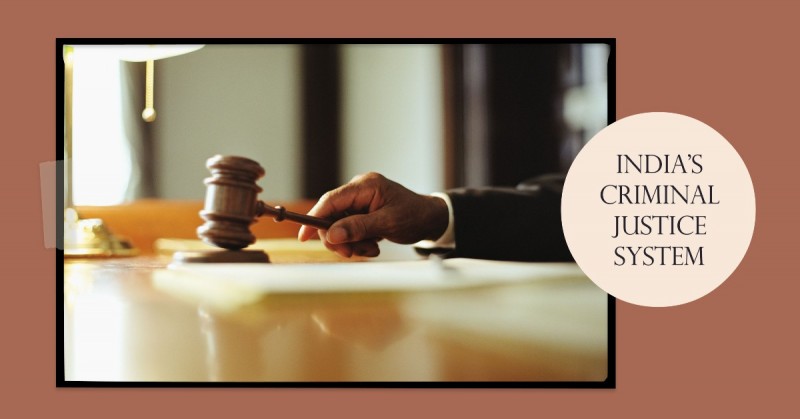
The criminal justice system is a cornerstone of any society, ensuring the rule of law and providing justice to victims and the accused. In India, the criminal justice system plays a pivotal role in upholding rights and combating crime effectively. This comprehensive article delves into the structure, challenges, and ongoing reforms within India's criminal justice system.
Unraveling the historical tapestry of India's criminal justice system reveals a blend of legal traditions and colonial legacies. The foundations were laid during the British Raj, while post-independence, India adopted a democratic constitution emphasizing the rule of law and safeguarding fundamental rights.
India's criminal justice system encompasses various components, including law enforcement agencies, the judiciary, and the corrections and rehabilitation system.
Law Enforcement Agencies
The responsibility of maintaining public order, preventing crime, and investigating criminal offenses rests with law enforcement agencies such as the police, Central Bureau of Investigation (CBI), and state and central agencies. Collaborative efforts between these agencies are essential for effective crime prevention, investigation, and prosecution.
Judiciary and Courts
India's judiciary comprises the Supreme Court, High Courts, and lower courts. Functioning as the custodian of justice, the judiciary interprets laws, adjudicates disputes, and ensures fair administration of justice. The hierarchical structure ensures due process, fair trials, and protection of individual rights.
Corrections and Rehabilitation
The corrections and rehabilitation system focuses on the punishment, rehabilitation, and reintegration of offenders. Prisons, probation, parole, and various correctional programs aim not only to punish but also to reform and reintegrate offenders into society.
Criminal Investigation Process
The criminal investigation process commences with the reporting of a crime and encompasses the gathering of evidence to prosecute the accused.
Reporting a Crime
Prompt reporting of a crime by victims or witnesses is crucial to initiate the investigative process.
First Information Report (FIR)
Upon receiving a complaint, the police register a First Information Report (FIR) that serves as the foundation for further investigation. The FIR comprises crucial details about the offense.
Investigation and Evidence Collection
The police conduct a meticulous investigation, collecting evidence, recording statements, and identifying suspects. Witness testimonies, forensic evidence, and relevant information are gathered to build a strong case.
Arrest and Custodial Rights
If sufficient evidence is gathered, the police can make arrests. During arrest and detention, the accused possesses specific rights, including being informed of the charges and the right to legal representation.
Criminal Trials and Due Process
Criminal trials in India follow a well-defined process to ensure fair and impartial adjudication.
Preliminary Hearing
The court conducts a preliminary hearing to determine if there is enough evidence to proceed with the trial. During this stage, the accused is informed of the charges and has the right to present their defense.
Trial Proceedings
During the trial, the prosecution and defense present their arguments and evidence. Witness testimonies are examined, cross-examined, and evidence is meticulously scrutinized.
Evidence Presentation
The prosecution presents evidence to establish guilt beyond a reasonable doubt, while the defense challenges the prosecution's case. The judge evaluates the evidence and delivers a verdict.
Legal Representation
The accused has the right to legal representation and can engage an advocate to present their defense. Legal aid services are provided to those who cannot afford representation.
Sentencing and Punishment
Upon conviction, the court determines the appropriate punishment based on the severity of the offense and relevant laws.
Punishments in India include imprisonment, fines, probation, community service, and, in some cases, the death penalty. The choice of punishment depends on the nature and gravity of the crime.
Sentencing Guidelines
The court adheres to sentencing guidelines, considering mitigating and aggravating factors, deterrence, and prospects of rehabilitation.
Prison System and Rehabilitation
India's prison system aims to provide secure custody, basic amenities, and opportunities for reformation and rehabilitation. Correctional programs focus on education, skill development, and psychological support to prepare inmates for a productive life upon release.
Challenges and Reforms
The criminal justice system in India confronts several challenges that impede its effectiveness and efficiency.
Backlog of Cases
A significant challenge is the backlog of pending cases, resulting in delayed justice. The high volume of cases strains the system, leading to prolonged trials and increased frustration for victims and the accused.
Delayed Justice
Delays in case resolution undermine public trust in the system. Measures like fast-track courts and alternative dispute resolution mechanisms have been introduced to address this issue.
Police Reforms
Comprehensive police reforms are required to enhance professionalism, accountability, and community policing. Initiatives focus on improving training, infrastructure, and adopting technology in law enforcement.
Prison Reforms
Reforms in the prison system aim to tackle issues such as overcrowding, inadequate facilities, and ensure effective rehabilitation and reintegration of offenders.
Public Perception and Criticisms
Public perception of India's criminal justice system varies. While many have faith in its ability to deliver justice, others criticize its slow pace, corruption, and biases. Public awareness, education, and engagement are vital in addressing these concerns.
Conclusion
India's criminal justice system serves as the guardian of justice, upholding the rule of law and ensuring justice for all. Despite challenges, ongoing reforms aim to strengthen various components, reduce case backlogs, enhance police accountability, and improve prison systems. A robust and equitable criminal justice system is pivotal for a just society.
Youth Stabbed Over Petty Argument in Delhi
Assam Police Crack Down on Drug Peddling, Seize Drugs Worth Rs 25 Cr
After police action is delayed, Minor rape victim in UP ends life